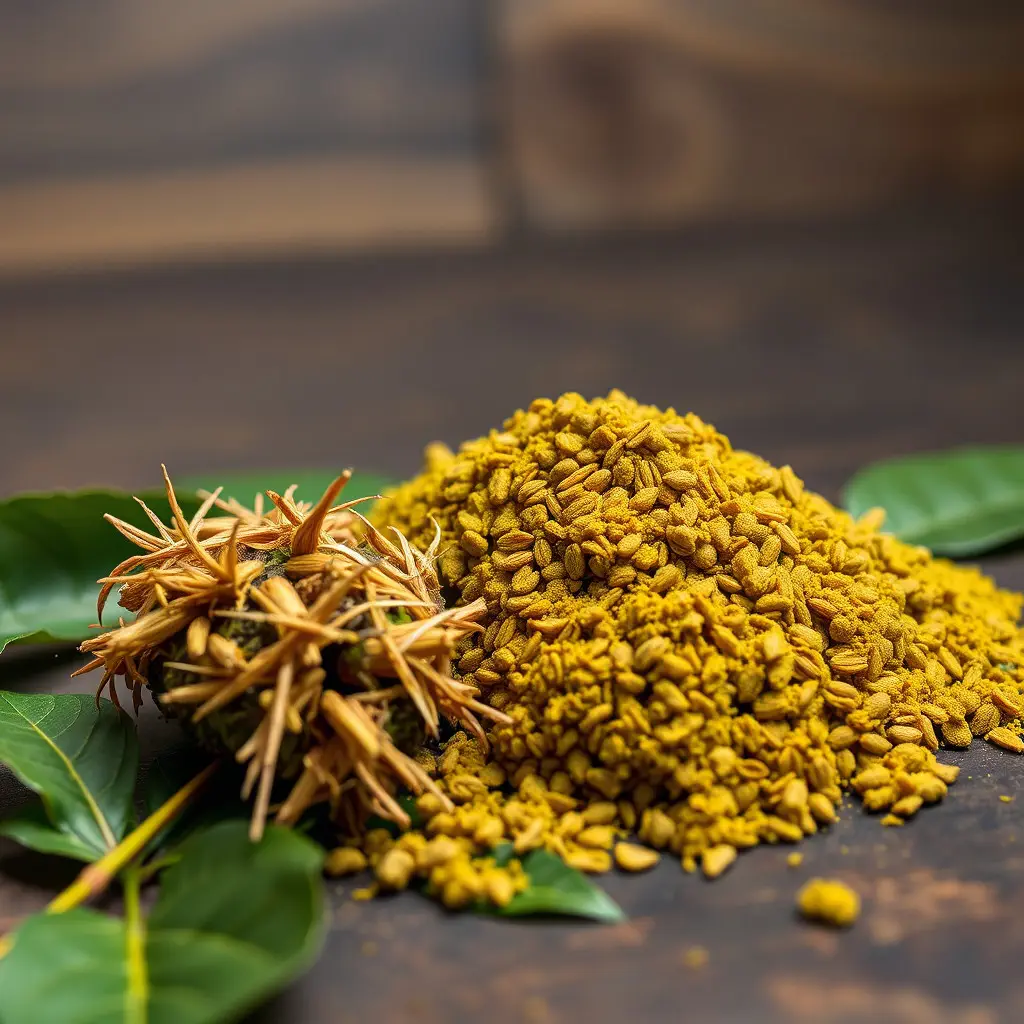Indiana residents have found kratom, derived from Mitragyna speciosa leaves and traditionally used in Southeast Asian herbal medicine, to potentially offer anti-inflammatory benefits. The presence of alkaloids like 7-hydroxymitragynine and mitraphylline may interact with the endocannabinoid system and opioid receptors, which users report can help reduce inflammation and pain. Scientific investigation is needed to fully understand kratom's effects and mechanisms, but there's growing interest in its role in managing inflammatory conditions naturally. Studies are focusing on how kratom alkaloids might modulate immune response pathways by reducing pro-inflammatory cytokines. However, it's crucial for individuals to consult healthcare providers before using kratom due to individual differences in response and the need for more research on its efficacy and safety. Additionally, navigating Indiana's complex legal landscape regarding kratom is essential, with varying regulations across different local jurisdictions. Consumers should purchase kratom from reputable vendors offering transparent labeling and third-party lab test results to ensure product quality and safety. This approach supports both legal compliance and personal health when exploring the potential of kratom for inflammation reduction within Indiana's context.
Exploring the potential of kratom as a natural inflammation reducer, this article sheds light on its effects as experienced by users in Indiana. Delving into the science behind kratom’s anti-inflammatory properties, we examine how this botanical supplement may offer relief from inflammatory conditions. Additionally, we navigate the legal landscape of kratom accessibility within Indiana, guiding readers on sourcing high-quality kratom while adhering to state regulations. Join us as we uncover the multifaceted role of kratom in managing inflammation, with a focus on practical insights from Hoosier users and the underlying scientific principles.
- Understanding Kratom's Role in Inflammation Reduction: An Insight from Indiana Users
- The Science Behind Kratom and Its Anti-Inflammatory Properties
- Navigating Legal Considerations and Accessing Quality Kratom in Indiana
Understanding Kratom's Role in Inflammation Reduction: An Insight from Indiana Users

users in Indiana have reported significant benefits from incorporating kratom into their wellness routines, particularly for its potential anti-inflammatory properties. Kratom, derived from the leaves of Mitragyna speciosa, a plant indigenous to Southeast Asia, has been traditionally used in herbal medicine practices. Indiana kratom users often attest to its efficacy in alleviating symptoms associated with inflammation, a common issue affecting various systems within the body. The alkaloids found in kratom leaves, such as 7-hydroxymitragynine and mitraphylline, are thought to contribute to its anti-inflammatory action. These compounds interact with the body’s endocannabinoid system and opioid receptors, which may help in reducing inflammation and pain responses. The anecdotal evidence from Indiana kratom users underscores the potential of this supplement as a natural approach to managing inflammatory conditions, although further scientific research is necessary to fully understand its mechanisms and effects. As interest in holistic health continues to rise, the experiences of these users highlight the growing curiosity about kratom’s role in inflammation reduction and its implications for broader healthcare discussions.
The Science Behind Kratom and Its Anti-Inflammatory Properties

MIT (Mitragyna speciosa) Kratom, originating from Southeast Asia and increasingly recognized in Indiana for its medicinal properties, has garnered attention within the scientific community for its potential anti-inflammatory effects. The leaves of kratom contain a blend of alkaloids, with mitraphylline and 7-hydroxymitragynine often highlighted due to their pharmacological actions. Research conducted on these compounds has shown that they may exert anti-inflammatory responses by modulating key signaling pathways involved in the body’s immune response. This modulation can potentially reduce the production of pro-inflammatory cytokines, which are known to play a pivotal role in various inflammatory conditions. Studies have indicated that kratom alkaloids might influence the activity of nuclear factor kappa B (NF-κB), a transcription factor critical to the immune system’s response to inflammation and stress. This effect could be beneficial for individuals seeking natural alternatives to manage chronic inflammation, as is often seen in conditions like arthritis or chronic pain.
In Indiana, the interest in kratom supplements has led to a growing body of anecdotal reports and preliminary scientific studies examining its efficacy and safety for inflammation reduction. While the full scope of kratom’s anti-inflammatory potential is still under investigation, the initial findings are promising and suggest that further research could lead to a better understanding of how kratom might be utilized in complementary or integrative medicine approaches for inflammatory conditions. As with any supplement, it is important for consumers to consult with healthcare providers before incorporating kratom into their health regimen, considering the complexity of factors influencing individual responses to such compounds.
Navigating Legal Considerations and Accessing Quality Kratom in Indiana

Navigating the legal landscape regarding kratom in Indiana is a critical first step for residents interested in its potential anti-inflammatory benefits. As of the knowledge cutoff date, kratom’s legal status varies across different jurisdictions within Indiana. At the state level, kratom is legal; however, local ordinances may impose restrictions or bans. Consumers must stay informed about their local laws to comply with regulations and ensure legal access to kratom products. It’s imperative to verify the current status of kratom legality in specific Indiana cities or counties before purchasing or using these supplements.
Accessing high-quality kratom in Indiana, where it is legal, involves a discerning approach due to the market’s varying product quality and purity. Indiana residents should seek out reputable vendors that offer transparent labeling and third-party lab testing results for their kratom products. This ensures that the supplements are free from adulterants and contaminants, which is crucial for both legal compliance and personal health. Online retailers and local stores that prioritize quality control and customer safety can provide reliable sources of kratom. It’s advisable to research vendors thoroughly, read customer reviews, and select those with a solid reputation for offering authentic, high-quality kratom products in Indiana.
Kratom’s potential as a supplement for inflammation reduction, as explored through user experiences in Indiana, aligns with scientific findings on its anti-inflammatory properties. Users in the state have reported significant benefits, offering valuable insights into its practical application. It is clear that kratom could play a notable role in natural health solutions for those dealing with inflammation-related conditions. However, it is crucial for potential users to navigate the legal landscape carefully and seek out quality products to ensure safety and efficacy. With responsible use and further research, kratom may emerge as a viable option within Indiana’s holistic health strategies.






